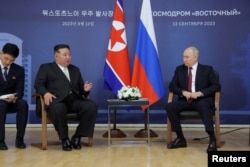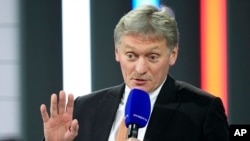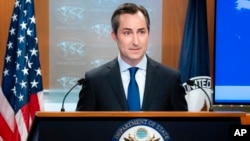The future of international efforts to curb Pyongyang’s nuclear weapons program is in doubt after Russia voted on Thursday to dissolve a body designed to monitor implementation of U.N. sanctions against North Korea.
Since its establishment in 2009, the so-called “Group of Experts” has played a key role in implementing UN Security Council resolutions targeting North Korea. Most notably, the eight-member panel regularly issues reports outlining alleged violations of U.N. sanctions, bringing public attention to the issue and prompting follow-up coverage by independent news media.
While Security Council cooperation on North Korea has eroded and North Korea continues to find ways to evade existing sanctions, the disbandment of the panel could remove remaining obstacles to North Korea’s weapons programs and undermine global nonproliferation efforts.
How did we get here?
The Security Council imposed sanctions on North Korea for the first time after it conducted its first nuclear test in 2006. As North Korea stepped up its illegal weapons development in subsequent years, the Security Council expanded sanctions.
As veto-wielding permanent members of the Security Council, Russia and China voted in favor of imposing sanctions on North Korea. But as their respective relations with the United States sour, both countries have called for sanctions to be eased or lifted, raising questions about the survival of the panel.
According to multiple media reports, in recent negotiations, Russia and China have pushed to add a “sunset” clause to at least some North Korea sanctions, which would expire after a fixed period of time if they fail to agree on extending them. Report.
With those efforts apparently failing, Russia voted on Thursday against extending the panel’s annual mandate, while China abstained. Without unanimous support, the panel’s term expires on April 30.
Why is Russia trying to kill the UN sanctions team?
For years, Russia has argued that sanctions against North Korea are outdated and counterproductive. Moscow believes that sanctions have not only failed to persuade Pyongyang to give up its nuclear weapons, but have caused a humanitarian crisis in the country.
U.S. officials disagree, saying North Korea should be spending heavily on weapons, not food, for its people.
In recent years, Russia has become increasingly bold in engaging in activities that may clearly violate United Nations sanctions. Most notably, U.S. officials say Russia has imported at least 10,000 containers filled with North Korean munitions, including ballistic missiles, for use in the war in Ukraine.
Russia and North Korea have both denied arms transfers, although growing evidence from commercial satellite photos appears to show North Korea making multiple shipments.
British Financial Times The newspaper reported this week that Russia has also begun supplying oil directly to North Korea in defiance of U.N. sanctions. In 2017, the Security Council imposed strict limits on the amount of petroleum products North Korea could import.
U.S., South Korean and other Western diplomats who issued public statements after Russia’s vote on Thursday said that by effectively canceling the group, Russia may be trying to more easily hide its activities that violate North Korea sanctions.
“This is almost equivalent to destroying a CCTV to avoid being caught red-handed,” said Hwang Jung-kook, South Korea’s ambassador to the United Nations.
Russia itself also hints at selfish motives. Asked whether Friday’s vote meant Russia changed its policy on enforcing U.N. sanctions, Kremlin spokesman Dmitry Peskov said: “Such a position is more in our interests. The conversation was about of a group of experts. The problem is we don’t agree on what the project actually looks like.”
Will this move make it easier for North Korea to evade sanctions?
Many Western diplomats and analysts believe it is possible. One reason: The effort to collect and disseminate information about sanctions evasion could become more complex.
Chad O’Carroll wrote on NK News, the North Korea news site he founded, that the panel’s report included “a wealth of exclusive information from member states… as well as letters, photos and data obtained through the panel’s communications with relevant parties.” . “In many cases, journalists, private companies and individual governments lack the power or influence to access such material.”
In the absence of the expert panel, Washington and its allies have vowed to find a solution. At a news conference on Thursday, State Department spokesman Matthew Miller said the United States would continue to work to obtain information about North Korea’s “pursuit of illicit weapons.”
“We will continue to work to make this information public and available to other members of the Security Council,” Miller added.
Earlier this week, the United States and South Korea announced a task force aimed at preventing North Korea from accessing oil in violation of indefinite United Nations sanctions.
Leif-Eric Easley, a professor at Ewha University in Seoul, said trilateral cooperation between the United States, Japan and South Korea is also likely to increase.
He added: “More evidence of sanctions violations is likely to be released to the public as Russia and China’s limiting influence on headlines will disappear with the disappearance of the UN panel.”
However, it is unclear whether these smaller initiatives can replace the pressure generated by a unified Security Council. Failing that, many fear North Korea will more easily find the financial means to accelerate its nuclear buildup — and may even encourage other countries to follow its example.
South Korean Ambassador Hwang said Russia’s vote was a setback for the international nuclear non-proliferation regime.
“The permanent members of the Security Council and depositaries of the Nuclear Non-Proliferation Treaty have completely abdicated their responsibilities,” he said.
Follow us on Google news ,Twitter , and Join Whatsapp Group of thelocalreport.in


